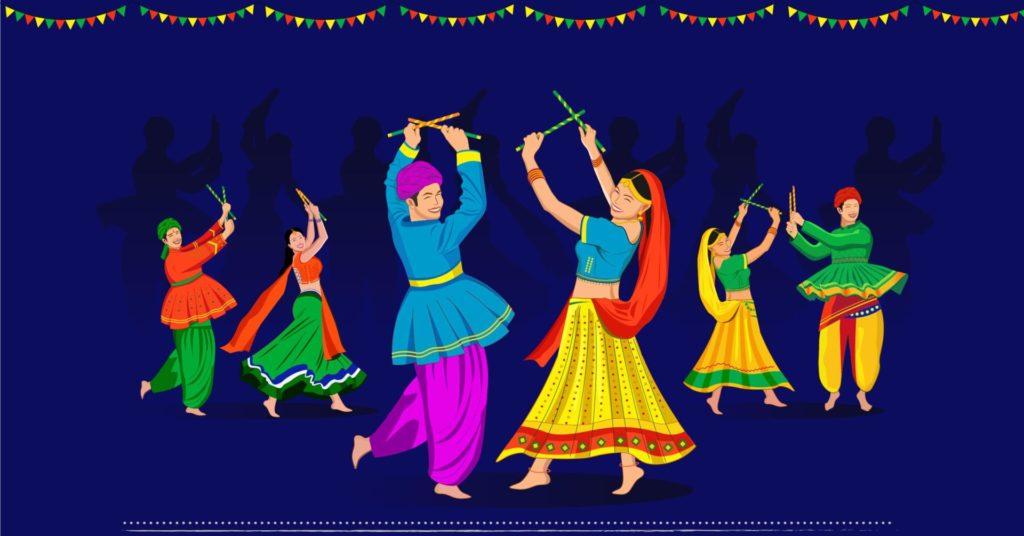Dahi Handi, Navaratri and Bhondla are well-known festivals celebrated in India,
mostly known for the energy they bring to our homes. Although very different from each other, these three share a perspective. Unlike other festivals, centred around prayer and rituals, Dahi Handi, Navratri and Bhondla involve more physical activities, like dancing, singing and visiting family members. But have you ever thought of the psychological aspects of celebrating festivals, especially these three?
How Festival Season Affects Your Well-Being in a Positive Way
Celebrating festivals provides you with a break from your regular routine. It also can be motivational during hard times as it is something you look forward to. Since these festivals include various physical activities like dancing or performances, they can be a good stress buster.
Meeting new people or connecting with your old friends on such occasions might be just the thing you need to keep your mind off other stressors. By interacting with other people, you get introduced to new topics, learn about new cultures, and you may develop new interests. This might also give you a new perspective on life.
When you exercise, your body releases chemicals called endorphins. These endo interact with the receptors in your brain that reduce your perception of pain. Endorphins also trigger a positive feeling in the body, similar to morphine.
The Downside: How Festivals can be Stressful
But not everyone finds the festival to be joyful. Celebrating such festivals can be hectic for people, even without them participating, thanks to the excess traffic on the roads. It can also be very noisy and the celebrations last till late at night.
Some people who are not very good at handling social situations can get overwhelmed by the number of people they have to deal with. Some may feel it is a burden to celebrate.
On another level, unwanted memories associated with the festival or incidents which took place during the festival, like an accident or loss of a close friend or family member, can resurface. Seeing others enjoy themselves on this day can make one feel sad.
Dahi Handi
Dahi Handi is an entertainment and competitive event associated with Krishna Janmashtami, the Hindu festival celebrating the birth of the god Krishna. It involves a clay pot containing milk products like curd or butter, hung up high in the air, with different teams taking turns trying to hit the hanging pot by forming human pyramids.
The event is derived from the legend of Lord Krishna and his friends mischievously stealing butter and curd from neighbouring homes in Gokul as a child. It is all fascinating and fun to watch, but it can also be dangerous as the risk of falling down or people falling on you cannot be neglected.
It can lead to broken bones, disabilities or even loss of life. But if everything is executed perfectly, the team usually wins the prize money, which can bring some financial stability to a struggling person’s life.

Unveil the effects of society on your personality
Bring positive changes where required.
Navratri
Navaratri is one of the most popularly celebrated Hindu festivals, conducted in honour of Goddess Durga. It spans over nine nights, first in the month of Chaitra and again in the month of Sharada.
On Vijayadashami, one of the days in the Navaratri, the traditional ‘burning of Ravana’ takes place. It symbolises the burning of evil energy and beginning a new start in life. For fun, the colour of the clothes you are supposed to wear for these nine days is pre-decided. Everyone colour-codes their dress and come together to click pictures and celebrate the festival.
Bhondla
The traditional Maharashtrian festival, Bhondla, was devised for married young women to take a break from their in-laws for a few days. Back girls would get married off at a very young age; it was vital for them to see their parents whenever possible.
A sculpture of an elephant is placed between the circle formed by the ladies participating in the Bhondla. Everyone then rotates around in the circle singing songs. It is comparatively a fading tradition but plays a crucial role in bringing like-minded people together.
Socialising with people you can relate to and learning and teaching things to people boosts your confidence and makes you happy. The songs associated with Bhondla are light-hearted, usually poking fun at mothers-in-law. They were a source for married women to vent their emotions since they would often be treated harshly at their husband’s homes. Once the actual bhondla is concluded, there is a ‘khirapat’ which is generally a snack or sweet cooked as the prasad. The final game is to guess the khirapat .
Make the Most of the Festive Season
The months ahead are filled with celebrations and festivities – and now that you know the positive and negative psychological effects of attending these celebrations, you can make an informed decision about how you wish to spend your festival days and make the most of the season.
Read More:
Teenagers and Social Media: Distraction and Low Concentration
Dhol Tasha Pathaks: Devotion and Psychological Perks
Western Festivals and Their Effect On Mental Health







